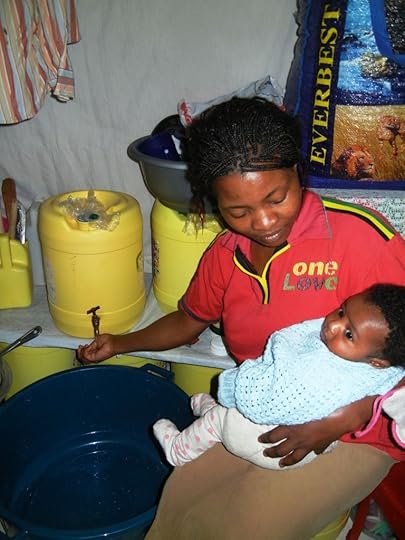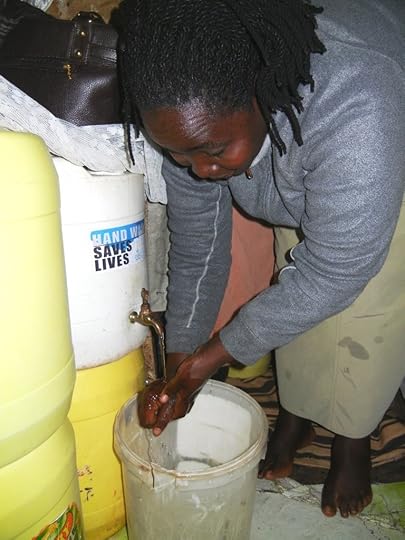Rye Barcott's Blog, page 16
January 27, 2015
A Renewed Partnership with Ronald McDonald House Charities
For the past 2 years, Carolina for Kibera has partnered with Ronald McDonald House Charities (RMHC) on a large-scale project to bring clean water straight to Kiberan families. The campaign, conducted by Community Health Workers (CHWs), reached thousands of people throughout Kibera and brought 3,235 easy-to-use hand-washing stations right to Kiberan households. In the process, CHWs conducted health outreach through door-to-door screenings, bringing basic health information and services to over 10,000 families. In short, through our collaboration with RMHC, CFK created great impact by keeping families, especially families with children under 5 years old, healthy and knowledgeable about health resources in their community.
We are extremely grateful for RMHC’s support, and incredibly pleased to announce that our partnership will continue for another 2 years! The aim of this renewed collaboration is to build upon the work that our team has already accomplished by training more Community Health Workers and providing additional health information and access to health services to families in Kibera. RMHC has contributed millions of dollars to 9 organizations, CFK included, to continue bringing innovative health solutions to underserved communities. We are honored that RMHC sees the value in CFK’s work, the talent of CFK’s team of Community Health Workers, and the potential of the Kiberan community to thrive.
Below, you can find the first half of the official press release announcing RMHC’s collaboration with all 9 organizations to which it has pledged support for the next 2 years. (Click here or on the image to view the full release.) Thank you again, Ronald McDonald House Charities!
January 22, 2015
The CFK Sprinters Made National News — Twice!
It’s not every day you make Kenya National News! To close out 2014, the CFK Sprinters were featured not once but twice in short news clips on some of Kenya’s most popular TV broadcast networks. (You can find both below, or here and here.)
First, Kenya Citizen TV asked Coach Innocent Philip to show their news crew around Kibera and to take them to a jump rope practice. In the video, Innocent reflects on how CFK’s jump rope program began (with help from Michael Fry of One World One Rope), why he decided to become a coach, and why jump rope is an important activity for Kiberan youth. In the second clip, Voice of America interviews Coach David Okoth and Jumper Wycliffe on how they both got started with the CFK Sprinters and what it means to them.
The CFK Sprinters had a whirlwind year last year — from excelling at the East Africa Jump Rope Competition and Camp to being featured by the Los Angeles Times in advance of the World Jump Rope Competition, and now being profiled on some of Kenya’s most widely watched networks. It’s an exciting time for jump rope in Kibera, and the CFK Sprinters will keep performing and spreading the sport of jump rope nationwide. Enjoy the clips and stay tuned for more news from the CFK Sprinters!
Kenya Citizen TV:
Voice of America:
January 13, 2015
“Passion Is My Driving Force”: An Update on Laurine and John, Scholarship Recipients
Photo by Caitlin Kleiboer.
It’s been awhile since we last heard from the first recipients of Carolina for Kibera’s Alan Cross Memorial Scholarship, Laurine Oloo Otawa and Antony John Mwaura. The new year encouraged CFK staff to reach out to Laurine and John to see how they are doing, ask about challenges and accomplishments, and learn about what’s on their horizons. And both of them have certainly been busy.
After transitioning from a degree in Clinical Medicine to a degree in Nursing, John has been studying diligently at the Tumu Tumu School of Nursing, located in central Kenya. He’s currently in his second year, and has had to adjust to more in-depth and vigorous classes. Sometimes, he admits, he has opted to sacrifice free time on weekends to accommodate the demands of the program. He continues undeterred, saying, “Passion, character, and attitude have been my driving force in the pursuit of my education.”
In addition to his coursework, John was also awarded a Medical Placement in the Karatina District Hospital near where he attends college. He will volunteer in this program for 3 months, where his daily activities include attending to clients as their medical professional, while under supervision of a resident doctor. He says the experience of attending to clients is both humbling and fulfilling. He has plans to graduate in May 2017.
 Unlike John, who will be in school for a couple more years, Laurine has plans to graduate in December of this year! Currently, she’s finishing up her degree at the Technical University of Kenya, where she is pursuing a Diploma in Technology Health Records and Information Technology. Laurine was awarded the Alan Cross Memorial Scholarship in 2012 after she began working at the Tabitha Clinic as a janitor to start saving money for college. Now, in addition to working on the janitorial staff, she puts her training to work at the clinic by managing several patient records, volunteering five days a week.
Unlike John, who will be in school for a couple more years, Laurine has plans to graduate in December of this year! Currently, she’s finishing up her degree at the Technical University of Kenya, where she is pursuing a Diploma in Technology Health Records and Information Technology. Laurine was awarded the Alan Cross Memorial Scholarship in 2012 after she began working at the Tabitha Clinic as a janitor to start saving money for college. Now, in addition to working on the janitorial staff, she puts her training to work at the clinic by managing several patient records, volunteering five days a week.
Balancing so many responsibilities can be exhausting, but Laurine believes being flexible and versatile are key to working at the clinic, managing patient records, studying for classes, and spending time with family. “My education has opened up new challenging opportunities that I am more than happy to take on,” she says. There is no doubt that when she graduates at the end of 2015 that she will be ready to take on more challenging opportunities during the next phase of her career.
To read more about Laurine and John, click here.
The Will to Learn
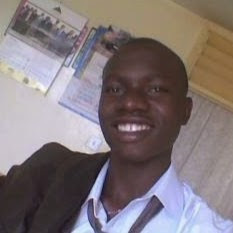 When Humphrey Luora is faced with difficult decisions, he reflects on a mantra his father often repeated as he was growing up. “My father always said, ‘No education, no life.’” That phrase has informed Humphrey’s life in a huge way, starting from when he was in primary school.
When Humphrey Luora is faced with difficult decisions, he reflects on a mantra his father often repeated as he was growing up. “My father always said, ‘No education, no life.’” That phrase has informed Humphrey’s life in a huge way, starting from when he was in primary school.
Humphrey got involved with Carolina for Kibera shortly after completing his final primary school placement exam in 2009. He was walking along the Kibera railway and saw a poster advertising volunteer positions with CFK’s Caught Offside Initiative, a peer education and mentorship program run through the Sports Association. The goal of Caught Offside is to offer a forum for young athletes to learn about and discuss issues they face while growing up. Topics they discuss include accurate reproductive health information, drug abuse, and the importance of education. In short, it was a great fit for Humphrey.
From there, Humphrey applied for and won a high school scholarship when CFK’s Education Program launched in 2010. Before earning the scholarship, he couldn’t regularly pay school fees. This kept him from focusing fully on school, since he was never sure if he would be kicked out of class or sent home because he hadn’t paid. Once he had a full scholarship, however, it became much easier to focus. Originally, he started at Olympic High School near Kibera, but then transferred his second year to Kameji Mixed Secondary School in Southwestern Kenya, giving him a chance to experience life outside of Kibera.
Because of his scholarship, he was able to graduate from high school with top marks. Now, he is pursuing a Bachelor’s Degree in computer science at Egerton University in Western Kenya. Growing up, Humphrey was always eager to learn more about computers, but he never had the opportunity to practice. He hopes to offer free computer tutorials to those who are in similar circumstances as he was when he was younger. In addition, Humphrey is quite talented in visual art, and hopes one day to fuse his artistic skills with his knowledge of computers through graphic design.
With Humphrey’s passion for education, and his eagerness to give back to his community, he will no doubt encourage and inspire others in Kibera to actively search for education. “Life is what you make it,” he advises. “You should always be a go-getter, because that’s the only way to achieve your goals.” That’s certainly true for Humphrey, and we’re happy to have helped him on his way.
November 11, 2014
Staff Spotlight: Leann Bankoski, Executive Director
By: Sophia Wilhelm, Communications Intern, and Nick Johnson, Staff Associate
—
When Leann Bankoski first lear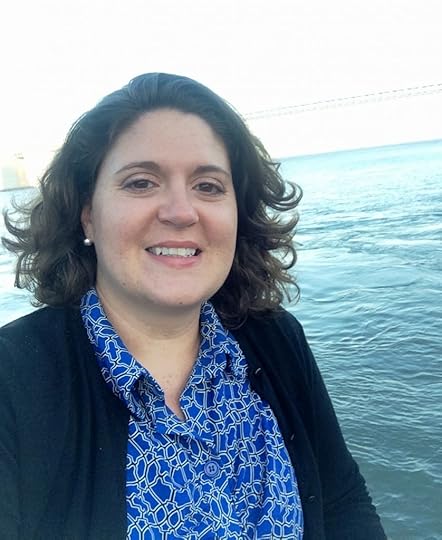 ned of Carolina for Kibera, the organization was not hiring. In fact, everything was done by volunteers and members of the Board of Directors who were willing to donate their time to creating change in Kibera. Restless in her job in New York City, she found CFK’s 2009 Annual Report, which had been dropped on her desk by a colleague, both intriguing and impactful. A few months later, on a trip to North Carolina to visit friends, she made a detour to Chapel Hill and met with a student volunteer to learn more. And as luck would have it, within 9 months, CFK was hiring and she joined as its first Executive Director.
ned of Carolina for Kibera, the organization was not hiring. In fact, everything was done by volunteers and members of the Board of Directors who were willing to donate their time to creating change in Kibera. Restless in her job in New York City, she found CFK’s 2009 Annual Report, which had been dropped on her desk by a colleague, both intriguing and impactful. A few months later, on a trip to North Carolina to visit friends, she made a detour to Chapel Hill and met with a student volunteer to learn more. And as luck would have it, within 9 months, CFK was hiring and she joined as its first Executive Director.
With her passion for serving others, Leann always knew that she wanted to pursue a career in community-led development. Before joining CFK, Leann’s 10 years of past experience in program development and non-profit fundraising made her exceptionally qualified for the position of CFK Executive Director. Over those 10 years, Leann recognized that the symptoms of poverty are similar no matter the location, whether that place is Nairobi, Nicaragua, or even New York City. Issues like inadequate housing, food insecurity, and unclean water affect all people living in poverty, regardless of where they live. “In poor communities around the world, the only way to live is day to day,” she explains. “The problem with poverty is that it prevents you from thinking about tomorrow. If you’re poor, surviving every day is a challenge that requires your complete focus.”
Leann believes that in order to alleviate poverty in places like Kibera, there must be a shift in focus from survival to growth. By listening to community members, CFK can offer resources and opportunities that help motivated Kiberans secure a better future. Creating change doesn’t happen overnight, however, and the staff and volunteers working with CFK know this. When she first joined the organization, Leann was struck by the staff’s dedication to CFK’s mission. “Unlike other organizations I’d seen, I could tell this team is in it for the long run. They’re competent and ambitious, small but mighty.”
Working at CFK’s U.S. office in Chapel Hill, North Carolina, has also brought her closer to a formative place from her past: Guilford College in Greensboro, NC, where she studied as an undergraduate. While in school, Leann had the opportunity to study abroad in Kenya. Though she had previously spent time traveling and studying in Latin America, she acknowledges that her time in Kenya was entirely transformative. “Kenya has such a compelling history. There is so much potential, even though it also faces significant challenges.” Her past experiences traveling in Kenya—including many trips to Kibera—gave her a crucial, personal perspective of Kibera when developing relationships with partners and leveraging support for CFK’s programs.
According to Leann, CFK’s work is about bringing hope and prosperity to as many people as possible. “The simplest way to say it is that we’re trying to create freedom. It’s always about people and working closely with each and every individual.” She adds, “More people coming into CFK’s programs is great, but more people graduating from programs is even better.” Under Leann’s leadership, CFK has grown tremendously and will continue to grow, providing robust support for Kiberans who seek it. The U.S. team is fortunate to have someone with such professional and personal experience devoting their talents to CFK’s purpose every day.
November 10, 2014
Responding to the Community’s Needs, No Matter What
Carolina for Kibera has always been an organization by Kiberans for Kiberans. When the community expresses a need, CFK responds to that need. When a community member seeks support, our staff connects them with resources. We have a wide range of programs and initiatives designed to support Kiberans as they lift themselves out of poverty.
Sometimes, however, the needs of the community go beyond the scope of our programs—and some of those needs are quite urgent.
Several weeks ago, an electrical power surge started a fire in a neighborhood located near the Tabitha Medical Clinic. Due to the lack of infrastructure in Kibera, it’s common for families in Kibera to have cheap, uninsulated power cables running outside (or sometimes beneath) their houses. These cables are interconnected and very difficult to control in case of something like a power surge. Once the fire started, it spread rapidly, destroying 21 houses that were homes to 75 families. Thankfully, no one was hurt, but the families lost everything.
As soon as CFK staff heard the news, they responded as quickly as possible. Rebuilding these houses was of the utmost importance, not only because these 75 families could not afford to be displaced, but because living without permanent shelter is detrimental to personal health, both physically and psychologically. Though the Kenya Red Cross set up temporary tents for all those displaced, residents were still at higher risk for contracting preventable illnesses as a result of homelessness.
CFK reached out to our friends at John Keeble Church, notifying them of the disaster and explaining how to help. Thanks to their support, CFK was able to acquire enough construction poles and other building materials for the families to rebuild their houses from the ground up. A month and a half later, these residents of Kibera have roofs over their heads once more.
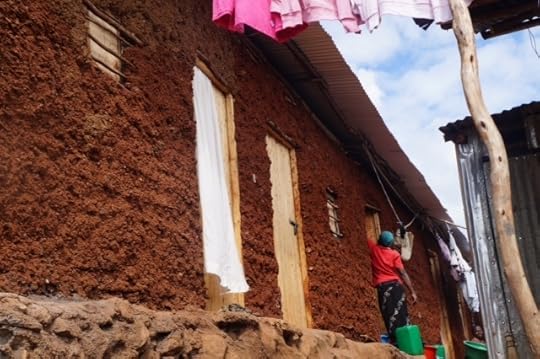
A woman stands outside the row of houses that the displaced families recently rebuilt.
Sometimes responding to the community’s most urgent needs falls outside of established programs. Our staff strives to be flexible and respond quickly in case of an emergency like this one. With help from friends, supporters, and partners, CFK continues to be an organization by the community for the community, no matter what.
“Let’s Move Forward” :: Francis’s History of Community Organizing
Francis Odera seems to be everywhere, involved in everything. As a resident of Kibera since 1994, he has seen the community grow and change, and as a volunteer with many programs, he has seen how different initiatives can make a profound difference.
Born and raised in Nyanza Province (in the western part of Kenya), Francis moved to Nairobi in 1989 in search of employment. Circumstances led him to move to Kibera in 1994 to live with his aunt. Little did Francis know this move would be life-changing for him. Kibera quickly became his permanent home and community.
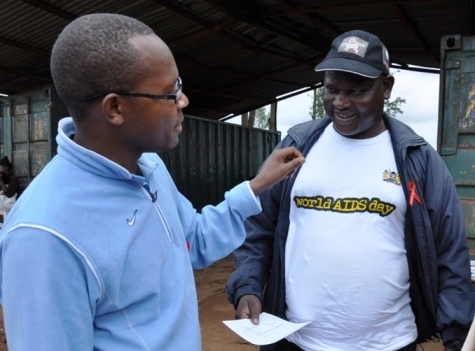
Francis, right, with Mark Muasa, Head of CFK’s Health Department.
After the Presidential election in 2007, when violence erupted across the country—and especially in Kibera—Francis was there. He was sometimes asked to intervene in violent or potentially violent disputes. On one occasion, he explained, “There was a man that had been stripped naked, surrounded by youth and was about to be killed. I didn’t yell. I just told them, ‘No. No,’ and the youth put down their weapons and the man lived.”
After tensions in the wake of the election settled down, Francis wanted to make sure that violence did not break out in Kibera the next time there were elections. He got involved in the Kenya government’s Peace and Reconciliation process, stepping into leadership roles in his community. “This was about having constructive ideas and working with communities to restore peace—to bring people together.” Much like CFK, Francis helped organize football tournaments and other community events to build community. The initiative started a dialogue of unity and peace throughout the community. “Peace doesn’t stop,” Francis said of this work. “I’m still an ambassador of peace.”
In 2011, the Ministry of Health started recruiting community members for its Community Strategy Policy, an initiative partially facilitated by CFK to extend basic health information into underserved communities. Francis was selected for Kianda, his village in Kibera. He was then trained by the government on basic health issues. As a Community Health Worker (CHW), Francis began working with different organizations to reach community members about personal and public health issues.
This is when Francis learned about Carolina for Kibera (CFK). “I met CFK when they advertised for volunteers for community health,” he said. “I was selected in 2012 to help identify malnourished children in the community.” In order to help people learn more about nutrition, he continued, “We followed up with community members after the screenings in order to sensitize them to these issues.”
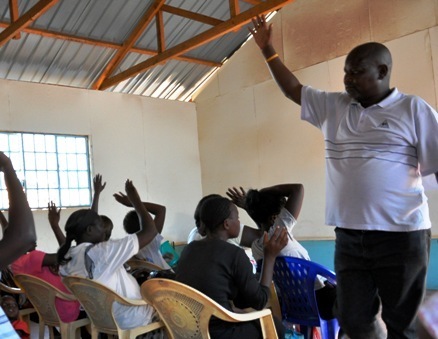 Francis has since been more and more involved in CFK programs as a volunteer, community member, and parent to six children. He is also involved with the Trash Is Cash program, helping to recruit youth for various program activities. Additionally, he encourages his own children to be part of CFK’s programs when they can. His only daughter is part of Daughters United and one of his sons is active in Trash Is Cash. “All the programs at CFK are community based. Since I am a parent and a part of the Kibera community, I have been asked to engage with many programs.”
Francis has since been more and more involved in CFK programs as a volunteer, community member, and parent to six children. He is also involved with the Trash Is Cash program, helping to recruit youth for various program activities. Additionally, he encourages his own children to be part of CFK’s programs when they can. His only daughter is part of Daughters United and one of his sons is active in Trash Is Cash. “All the programs at CFK are community based. Since I am a parent and a part of the Kibera community, I have been asked to engage with many programs.”
When asked what he wants for his community, Francis smiled and gathered his thoughts. “I want a changed attitude in the community. There’s a perceived attitude that people can’t change things themselves, but they need to see that it’s us who need to change so that everything else can change too. This can be done through information. People need proper, simple information. For example, if sanitation issues in the community lead to health problems then why not change the environment? Instead of getting sick and spending money to get treated, why not prevent people from getting sick?”
Noting that this can be difficult in Kibera with the amount of NGOs and different information circulating around the community, Francis said, “Yes, there are many NGOs in Kibera, but when you look for the work they do in the community, you don’t see it and can’t even find where they work. There really are only a few NGOs that are very serious and pushing to ensure change. CFK is one of them.”
Francis, always eager to serve the community in any way, actively encourages everyone around him to participate and grow together. “Let’s move forward together,” he said, offering a final, straightforward statement that summed up his attitude perfectly.
October 8, 2014
Staff Spotlight: Nick Johnson, Staff Associate
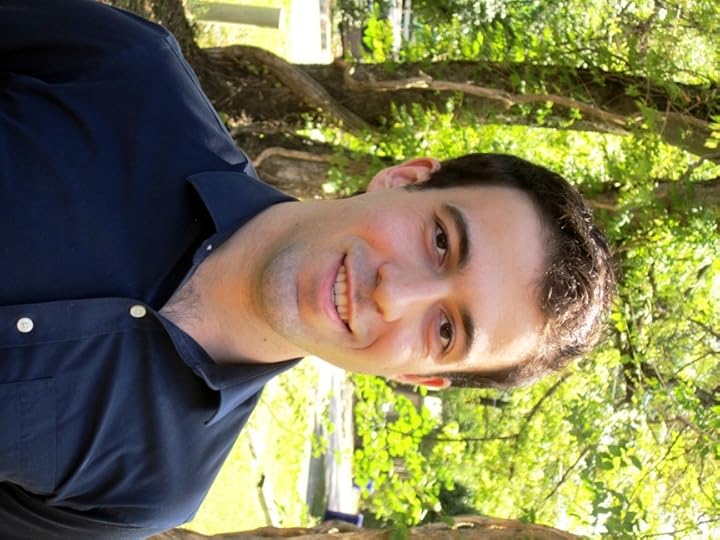 Before Nick got an internship with Carolina for Kibera during his senior year at UNC in 2013, he knew relatively little about Kibera, Kenya, or even the continent of Africa. As a Global Studies major, Nick’s academic and travel experiences focused on Spanish-speaking countries. Once he learned more about Kibera, however, he noticed similarities between movements for social change in Kibera and those he had learned about and worked with previously. With a new personal interest in CFK’s work, Nick decided to reach out and see how he could help. Leann, CFK’s Executive Director, was impressed with his writing skills and decided that he would be a good fit for an internship in communications.
Before Nick got an internship with Carolina for Kibera during his senior year at UNC in 2013, he knew relatively little about Kibera, Kenya, or even the continent of Africa. As a Global Studies major, Nick’s academic and travel experiences focused on Spanish-speaking countries. Once he learned more about Kibera, however, he noticed similarities between movements for social change in Kibera and those he had learned about and worked with previously. With a new personal interest in CFK’s work, Nick decided to reach out and see how he could help. Leann, CFK’s Executive Director, was impressed with his writing skills and decided that he would be a good fit for an internship in communications.
Nick’s first duties as an intern were to draft stories about CFK’s impact in Kibera for the blog, and to work with staff to launch a new, quarterly newsletter. At first, Nick found transitioning from academic and creative writing, with which he was more familiar, to documentary writing and storytelling quite difficult. “Finding a voice that is respectful, entertaining, and contextual—all in 500 words or less—was incredibly challenging for me,” he said.
His efforts paid off. As the school year came to a close and graduation loomed, CFK offered Nick a full-time position as a Staff Associate. This new role brought with it challenging expectations and tasks, such as managing CFK’s entire donor database, coordinating CFK’s annual fellowship for UNC students, and standard administrative tasks. And the hardest part? “Surprisingly, managing interns,” he admits. “Active management requires a lot of time and effort, which I didn’t understand until being on the other end of that relationship.”
Nick spends most of his time managing the blog, newsletters, and other CFK publications. In order to do this effectively, CFK staff recommended that he travel to Kibera to meet the Kenya staff and get a sense of what Kibera is like. When asked about his first impressions of Kibera, Nick replied, “Loud, dusty, and crowded.” He continued, “After noticing and understanding that these were facts of life there, it quickly went from feeling overwhelming to feeling normal.” After getting the chance to meet some members of the community, Nick grappled with another observation. “What really shocked and humbled me was that despite how poor and disenfranchised people were, they still had time to be kind and welcoming to me. People I just met treated me as if we were already friends.”
The nature of Nick’s work is reliant on the trust of CFK staff in Kenya. His role is to amplify the voices of people from the community rather than speak for them or in place of them. He hopes to publish stories that spark empathy and make people want to share them. “If I can communicate people’s struggles in a way that changes the reader’s perspective or makes them think differently about something, I’m doing my job.” He, like the rest of the staff as CFK, believes stories should come full circle so that they benefit the person whose story is being told. “I wish people understood that Kibera is not helpless, not hopeless. It’s just stuck. It’s a complicated place. I hope my little contribution will help un-stick it, ever so slightly.”
September 30, 2014
One Woman Saves Many Women: Spreading the Word About Cervical Cancer Screening in Kibera
By: Mark Muasa, Head of CFK Health Services Department
—
Cancer doesn’t discriminate, and Joyce knows it. Ever since she discovered in February that she was at risk for developing cervical cancer because of a precancerous lesion on her cervix, Joyce has been telling her female friends, neighbors, and clients of her salon to get screened the first chance they get. She knows that encouraging them to do so can save their lives.
![Joyce 1 [re-size]](https://i.gr-assets.com/images/S/compressed.photo.goodreads.com/hostedimages/1412128967i/11329001._SX540_.jpg)
From L to R: Cathrine, SRH Program Officer; Joyce; her husband, John; and Adah, Nurse at the clinic who specializes in sexual and reproductive health services.
Cervical cancer kills hundreds of thousands of women each year, even though it is preventable if caught early. In many parts of Kenya, women have a tremendous, unmet need for access to cervical cancer screening and treatment. And in low-income areas like Kibera, it’s even worse. To help meet this need in Kibera, CFK partners with Prevention International: No Cervical Cancer (PINCC), who train Tabitha Medical Clinic staff every year on the procedures needed to eradicate early signs of cervical cancer. Since December 2012, staff members at the Tabitha Medical Clinic have conducted several free screening events resulting in 369 women being screened and 79 being treated.
When Joyce visited the Tabitha Medical Clinic for the first time last February, she went to seek help for something completely different. The clinic staff encouraged her to also get screened since the procedure is quick, painless, and free. Much to her surprise, clinicians found a precancerous lesion on her cervix, which they immediately treated. Joyce has since made a full recovery and is cancer-free.
When we followed up with her, she explained that she had heard about cervical cancer, but never realized that she might have the disease. “If my symptoms were not detected early, I would be at risk,” she explained. “Now, when I meet other women, I encourage them to be screened for cervical cancer.”
In Kibera, the most difficult aspect of prevention is spreading the word—but Joyce and women like her are working together. At the salon she runs, Joyce regularly speaks to her female customers about getting screened, and she will often accompany them to the Tabitha Medical Clinic. Her courage has had an impact: more than 30 women among many she has spoken to have been tested. At least 9 of them have turned out to be positive, and many more are now going for check-ups. Joyce is happy to be helping others. “I don’t want anyone to die when there is an opportunity for us to live longer,” she says.
Joyce’s story shows how critical it is for women to be screened for cervical cancer, even if they are not experiencing symptoms. Even more importantly, it shows that the efforts of community volunteers to spread the word about screening services can save the lives of thousands of women each year.
September 23, 2014
Hand-Washing Is Child’s Play
By: Leann Bankoski, CFK Executive Director
—
Good health starts with good hygiene. And sometimes, the simplest solutions are the most effective—like washing your hands.
For two years, CFK has been working with Ronald McDonald House Charities to improve the practice of hand-washing in Kibera. Knowing that convenience is often related to establishing good hygiene habits, we’ve installed easy-to-use hand-washing stations in the homes of thousands of Kiberan families with children under 5 in the home.
Along with hygiene education materials and sensitization offered by local community health workers, the hand-washing stations are proving to be quite successful in improving health. And for the children in the home, the stations are often treated as a new toy—a curious novelty to be explored.
On a recent visit to Kenya, I walked through the community with Yunus, CFK’s Community Outreach Program Officer, and Francis, a Community Health Worker, as they checked in with families that recently received hand-washing stations. As a Community Health Worker, Francis emphasizes the importance of hygiene and monitors the health progress of families he visits. I felt fortunate to be invited into these community members’ homes, unannounced, to hear their stories and learn how they were making use of the stations. I’m eager for you to meet them as well! Below, you’ll find a few pictures from the visit.
—
Eunice and her 2 1/2 month old, Vincent. Eunice lives with her husband and 2 sons, ages 4 years and 2 1/2 months, in an incredibly small space. There is only room for a double bed, one chair and a bench against the wall. She is shy and quiet with a lovely smile. She said her 4 year old was incredibly excited when the tap was installed, wanting to use it constantly as he thought is was a new toy. This sort of enthusiasm has helped their whole family ensure that they all use it regularly.
Eunice shows off how she uses her tap. Her tap is uniquely disguised as a side table. Because her home is quite small, she has stacked up her water containers and put a lace tablecloth over them to hide them a bit. Eunice shared that she prefers to boil her water rather than use chlorine to clean her water, as she thinks the chlorine makes it taste funny. She is clever and uses the remaining charcoal from her fire after she’s finished cooking to boil the water.
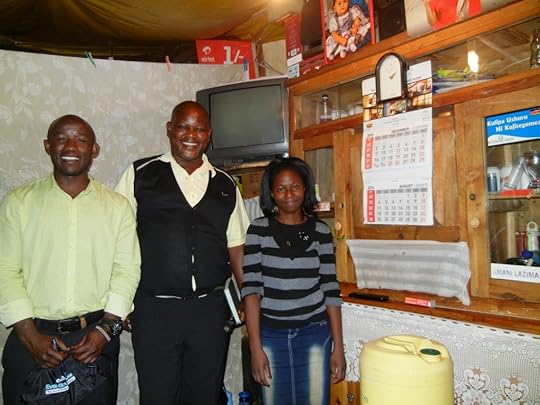
Yunus and Francis pose with Dorcas. Dorcas, her husband, and 2 young sons are big Liverpool FC fans. Posters and stickers adorn all the walls of their small home. Dorcas, like Eunice, said her boys think the tap is a lot of fun to play with and they love using it. They used to wash their hands in a wash basin, but now they use the tap.
—
Rye Barcott's Blog
- Rye Barcott's profile
- 7 followers


![John_Working_2_Caitlin_Kleiboer [web res]](https://i.gr-assets.com/images/S/compressed.photo.goodreads.com/hostedimages/1380990064i/3706472._SX540_.jpg)
![DSC_0619 [re-size]](https://i.gr-assets.com/images/S/compressed.photo.goodreads.com/hostedimages/1415716704i/11833968.jpg)
